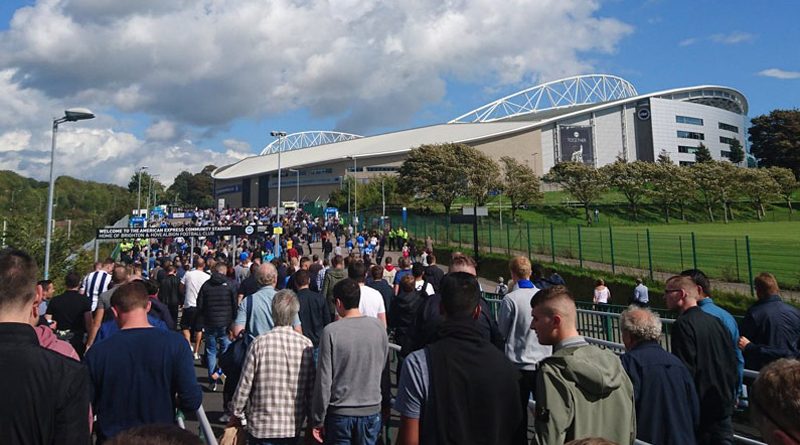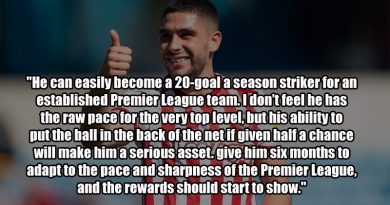Could an empty Amex Stadium help Brighton’s survival bid?
When the 2019-20 Premier League resumes, games will be taking place behind closed doors. It is going to be unusual to say the least – but what impact might an empty Amex Stadium have on Brighton & Hove Albion’s bid for top flight survival?
The aspect which has received most attention when people try and analyse the difference that playing behind closed doors makes is the erosion of home advantage.
Without supporters present, there is no 12th man to shout, scream and sing a side to a higher standard of performance than they might normally be capable of.
The intimidation level that visiting sides are exposed to from the terraces disappears. They can go about their normal game in peace, without the pressures of a home crowd doing everything in their power to will them to defeat.
Opposition teams – traditionally at least – have found it much harder to play in front of 30,000 Brighton fans than they would in an empty Amex.
Think back to those famous wins that Chris Hughton delivered in the Albion’s first two seasons in the top flight. Manchester United have been beaten on both of their previous visits to Sussex and deservedly so; compare that to Brighton’s form at Old Trafford, where the Seagulls have lost four out of four in all competitions, scoring only twice.
The Bundesliga gives some indication of the difference that empty stadiums can make to home advantage, and it doesn’t make for promising reading.
There have been 36 matches played behind closed doors in Germany and home advantage seems to have disappeared completely without supporters present.
Just eight of those games – 22% – have resulted in home victories. Before the season was suspended, 44% of Bundesliga fixtures saw the home side successful.
The Premier League’s average pre-lockdown was similar to Germany, with 45% of games being won by the home side. Presuming that the trends set in the Bundesliga are repeated here, games are going to be decided increasingly on talent.
Which is problematic for the the Albion. United, Arsenal, Liverpool and Manchester City are still to visit Brighton. All four are clearly better sides than the Seagulls, but if the Amex wasn’t empty than a baying home crowd could help to level the playing field.
History suggests that you could be quietly confident about taking something from United and Arsenal. Not so much without a home crowd to make Paul Pogba, Marcus Rashford, Mesut Ozil and Alexandre Lacazette disappear as they have on their previous visits.
The league table suggests that Brighton & Hove Albion’s chances of beating Newcastle United in their fifth and final home game will also be diminished in an empty Amex.
Steve Bruce has done a seriously underrated job to have the Toon in 13th spot. On paper, they may have one of the weakest sides in the Premier League, but they are still six points better off than Brighton are.
That sort of gap is no fluke and it suggests that with home advantage all but wiped out for Brighton, it might be worth sticking a few quid on Newcastle when they make the long journey south.
Reading this so far, you could be forgiven for thinking that Brighton are doomed. But everything discussed is based on the Amex being a major factor in boosting the Albion’s home performances.
What if the contribution of a full stadium has been overblown? What if Brighton actually end up performing better in front of a backdrop of blue and white seats and artificial crowd noise than they would with people actually there?
Prior to December 2018, you would have been mad to suggest that the Albion’s results and performances could benefit from playing in front of less Brighton supporters.
Hughton had ensured that his side were virtually unbeatable at the Amex against any side apart from the very best in the land.
In the Albion’s first 18 months as a Premier League club, the only opposition to leave Brighton with three points were Manchester City, Liverpool, Chelsea, Tottenham Hotspur and Leicester City.
The atmosphere at the Amex was generally good during that period – and it certainly played a part in Brighton’s success at home.
But in October 2018, something changed. Hughton led Brighton to three consecutive 1-0 wins, still the Albion’s best run of form since promotion to the top flight.
Prior to that, every Premier League point seemed precious. Every win treasured. And yet suddenly, 1-0 wins were no longer enough.
A significant proportion of Albion supporters wanted more. Wins had to be delivered with attacking football. Hughton made the fatal error of trying to appease those demands, switching from his trusted 4-4-1-1 to 4-3-3 with disastrous consequences.
Brighton fans who wanted to be better entertained at the Amex now went from witnessing West Ham United and Wolverhampton Wanderers beaten 1-0 to seeing Burnley, Southampton, Plucky Little Bournemouth and Cardiff City all leave with three easy points.
The atmosphere at the Amex tanked in the second half of last season, hardly a surprise when you find yourself losing 5-0 and 2-0 against two relegation-threatened sides in the space of three days.
Graham Potter’s appointment brought optimism that the Amex might become a fun place to watch football again, but that hasn’t really happened so far.
Hammering Spurs 3-0 less than six months after Mauricio Pochettino’s team had been Champions League finalists was a stunning result, but other than that there has been precious little to cheer at home this season.
Of the other Amex victories, October’s win over Everton owed much to a ridiculous VAR penalty awarded against Michael Keane. Bottom side Norwich City were woeful and the win over Bournemouth was hardly convincing.
As a result, the Amex atmosphere is as bad as it has ever been. Andy Naylor has written about it at length in The Athletic. Graham Potter has commented on it during his media duties and in his programme notes.
Paul Barber also used his column prior to January’s 1-1 draw with Aston Villa to address the issue. How many other CEOs tell their club’s fans to stop moaning and get behind the team?
On the rare occasions that there is any noise, it is normally supporters getting on the player’s backs, especially with the possession based system favoured by Potter.
When boo boys’ favourite Dale Stephens strokes the ball sideways to a full back, you can hear the collective groans as far away as Newhaven. An Adam Webster switch flies out of play and while Potter stands on the sidelines clapping his hands in the air, the Amex howls.
Maty Ryan rolling the ball out to a defender is greeted by jeers. When Potter waits 82 minutes to introduce Glenn Murray with Brighton needing a goal, the sarcastic applause and cheers leaves nobody in any doubt about what the home faithful makes of the lateness of the decision. None of which is particularly helpful to the 11 players on the pitch.
As a result of all this, there is a school of thought that Brighton might actually be better off playing in an empty Amex. They will be able to play Potter’s way without the added pressure of 30,000 supporters demanding the ball is moved forward quicker.
How much impact do the cries of “F**KING HELL” from the terraces have when Neal Maupay or Solly March miss their fifth chance of the afternoon?
Without their confidence being knocked by the home support, chance number six now might fly into the back of the net rather than the back of the stand.
Brighton under Potter, with their lack of urgency and their passing triangles, have often looked like they are playing on the training ground this season. There can’t be many Premier League sides better suited to thrive in conditions akin to a practice match than the Albion.
Perhaps the most compelling piece of evidence comes from Brighton’s away performances compared to their home showings. Potter’s most impressive wins have come on the road at Watford and Arsenal.
The 0-0 draw at Newcastle United was a performance that deserved three points. Pep Guardiola was impressed by the Seagulls at the Etihad Stadium, saying that he felt City had been given a game and the scoreline didn’t reflect the action on the pitch.
Brighton were excellent at Aston Villa before some poor game management in the final seconds, combined with Aaron Mooy’s earlier red card, threw away what would have been a good point after playing for over an hour with 10 men.
These better away performances provide a compelling argument that it doesn’t actually matter how many Brighton supporters the Albion play in front of. Given the lack of atmosphere at the Amex, an empty stadium could be a help rather than the hindrance most assume.
Or maybe we are simply clutching at straws following two wins in 19 and the toughest run-in of any of the clubs fighting relegation. We’ll find out in a couple of weeks.
WeAreBrighton.com have made it through to the final of the Football Content Awards 2020 – the only Brighton representative across all 17 categories. Please could you take 20 seconds to fill out the below form to vote for us as the Best Club Website in the country. Thank you.




